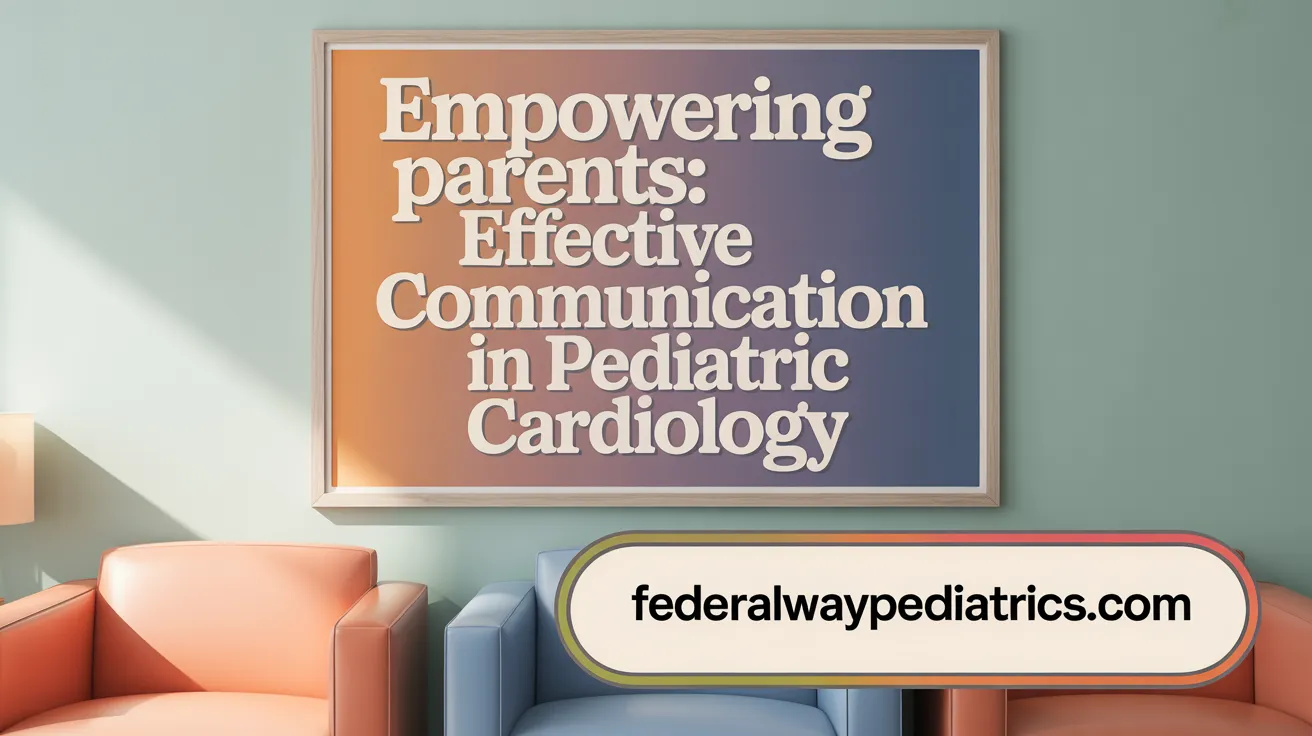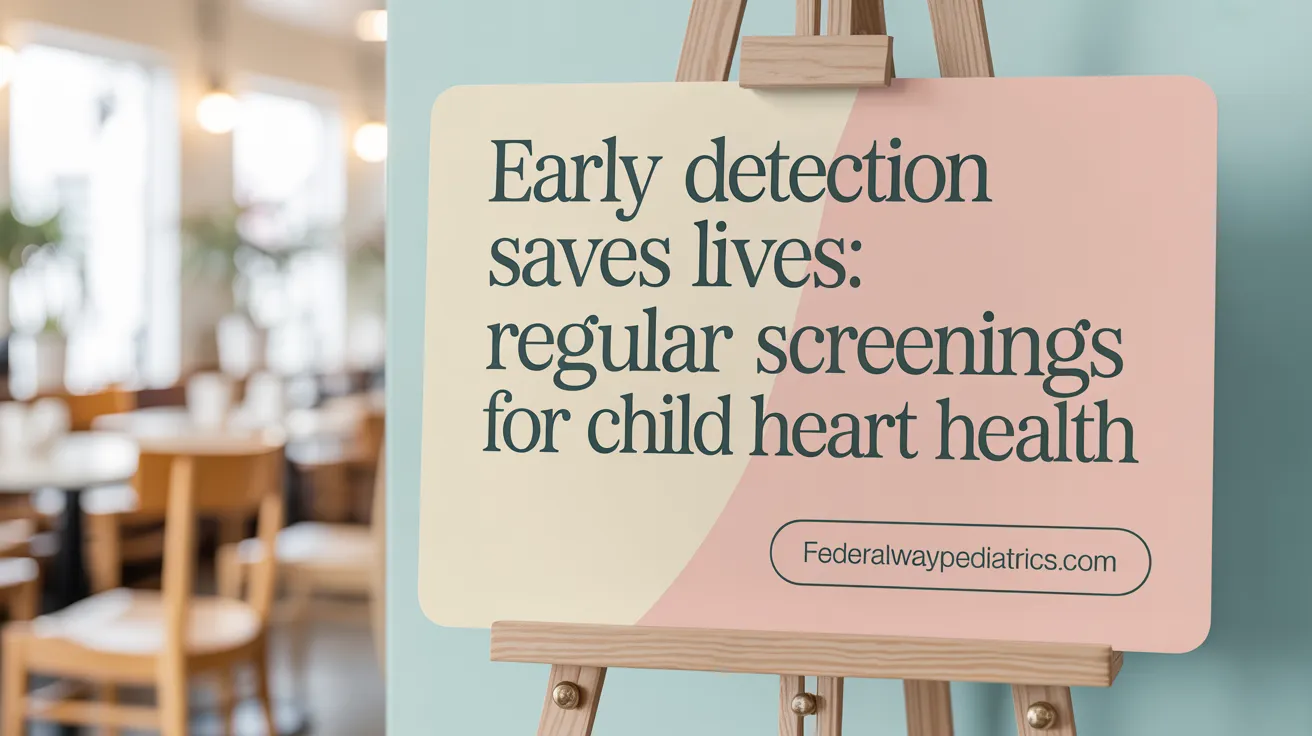Understanding Pediatric Heart Health: A Parent's Guide
Importance of Pediatric Cardiology
Pediatric cardiology focuses on diagnosing and treating heart conditions in infants, children, and adolescents. With congenital heart disease (CHD) affecting nearly 1 in 100 newborns in the U.S., specialized care is vital. Early detection through screenings and regular checkups can significantly improve outcomes.
Prevalence of Congenital Heart Defects
About 40,000 infants annually in the United States are born with congenital heart defects, which vary from minor issues to complex anomalies requiring surgery. Advances in technology allow for early diagnosis through tools like echocardiograms and fetal ultrasounds, enabling tailored treatment plans.
Role of Parents in Managing Heart Health
Parents play a crucial role in managing their child's heart health by understanding the diagnosis, supporting healthy lifestyle habits, and ensuring adherence to medical recommendations. Effective communication with healthcare providers and using educational resources helps parents navigate their child's care and improve quality of life.
Maintaining a heart-healthy diet, encouraging physical activity, and monitoring for symptoms such as fatigue or breathing difficulties empower families in proactive heart health management.
Recognizing and Diagnosing Congenital Heart Disease in Children
How common are congenital heart defects?
Congenital heart defects (CHDs) affect about 1 in 100 newborns in the United States, making them the most frequent birth defect. Annually, roughly 40,000 infants are born with heart structural problems ranging from minor, asymptomatic issues to complex anomalies that may require multiple surgeries. For detailed information on Congenital Heart Defect in Children and Congenital Heart Disease Treatment, refer to these resources.
What signs and symptoms might indicate a heart defect?
In newborns, serious symptoms include cyanosis (a bluish tint to lips, tongue, or nails), rapid breathing, swelling, and poor weight gain. Older children might show signs like fatigue, shortness of breath, fainting, or swelling. Some defects cause subtle signs like heart murmurs that are often detected during physical exams. More information is available at Signs of Heart Disease in Newborns and Pediatric Heart Health Symptoms.
How are congenital heart defects diagnosed?
Diagnosis often begins prenatally with ultrasounds and fetal echocardiograms allowing early detection and better planning. Postnatal diagnosis involves physical exams, listening for murmurs, pulse oximetry, and specialized tests such as echocardiography, electrocardiograms (ECG), chest X-rays, cardiac MRI, and catheterization to evaluate heart anatomy and function. For comprehensive details, see Diagnostic Tests for Heart Defects and Pediatric Cardiology Essentials.
What are some key risk factors and causes?
Risk factors include genetic conditions (e.g., Down syndrome), maternal infections such as rubella, maternal diabetes, certain medications, alcohol use, smoking during pregnancy, and family history. Abnormal heart formation primarily occurs during the first six weeks of pregnancy. Learn more about Risk Factors for Congenital Heart Defects and Cardiovascular Risk Factors in Childhood.
How have treatments and survival improved?
Medical advances have greatly increased survival rates and quality of life for children with CHDs. Treatment options range from medications to surgeries including open-heart procedures, catheter-based interventions, and, in rare cases, heart transplants. For details on treatment options, visit Pediatric Heart Care at UNC Children's and Mount Sinai Kravis Children’s Heart Center.
Why is early detection and counseling critical?
Early detection through prenatal screening enables multidisciplinary care preparation, including psychosocial support counseling, which balances hope with realistic outlooks. Detecting heart defects early allows timely interventions that can improve outcomes and reduce complications like heart failure or developmental delays. For insights on Navigating Parental Education in Pediatric Cardiology and Psychosocial Support for Families, see the linked resource.
The Vital Role of Parental Education and Communication in Pediatric Cardiology

Challenges of Communicating Complex Diagnoses to Parents
Communicating a child’s complex cardiovascular diagnosis can be daunting for healthcare providers and families alike. Approximately one-third of U.S. adults have low health literacy, which complicates the clear conveyance of detailed information about conditions such as congenital heart disease (CHD). Parents’ understanding of the diagnosis directly affects their child's care and quality of life, making effective communication essential.
Strategies to Enhance Understanding
Pediatric cardiology teams employ visual aids like diagrams and models to simplify intricate heart anatomy and treatments. Online resources further support families beyond clinic visits. The 'teach-back' method, where parents repeat information in their own words, is used widely to confirm comprehension and address misunderstandings promptly.
Assessing Family Health Literacy
Recognizing diverse literacy levels among families helps providers tailor communication and educational materials. Assessments may inform decisions about how much detail to provide and the format best suited for each family’s needs.
Involving the Child in Health Discussions
Encouraging age-appropriate dialogue directly with the child empowers them and fosters readiness for self-care as they grow. Providers use child-friendly language and include children in examinations and conversations to facilitate this engagement.
Addressing Emotional Impact on Families and Providers
Receiving a diagnosis of a pediatric heart condition can be distressing for families. Providers also face emotional demands caring for complex cases. Multidisciplinary teams often include psychosocial support to help families process the diagnosis and cope effectively.
Multidisciplinary Support for Families
From prenatal counseling through long-term management, care teams involve pediatric cardiologists, nurses, social workers, and psychologists. This collaborative approach ensures families receive honest, realistic information alongside emotional and logistical support tailored to their journey.
Establishing Heart-Healthy Habits Early in Childhood

How Does Diet and Nutrition Affect Long-Term Heart Health?
A nutritious diet in childhood helps lay the foundation for lifelong cardiovascular well-being. Eating plenty of fruits, vegetables, whole grains, lean proteins, and reduced-fat dairy supports heart health. Limiting ultra-processed foods high in sugar and saturated fats can prevent early development of conditions like high cholesterol and obesity, which become risk factors for heart disease later in life.
What Are the Recommended Dietary Guidelines for Children?
Children aged 2 and older should maintain a diet with about 30% of calories coming from fats, emphasizing unsaturated fats from plant sources while limiting saturated and trans fats. The MyPlate guide encourages balanced meals including grains, vegetables, fruits, dairy, and protein, and suggests keeping daily salt intake below 2,300 milligrams. Involving children in meal planning and food preparation helps foster healthy eating habits.
Why Is Physical Activity Important and What Are the Guidelines?
Regular physical activity strengthens cardiovascular fitness and helps maintain a healthy weight. Children aged 6 and older should get at least 60 minutes of moderate to vigorous activity daily. Activities can include aerobic exercises like running or biking, active play, organized sports, and strength training, all contributing to better heart health and overall physical development.
How Can Healthy Weight and BMI Be Maintained?
Maintaining a healthy body mass index (BMI) — generally under 25 — reduces risks of high blood pressure and cholesterol. Balanced nutrition paired with regular physical activity supports healthy weight. Monitoring growth with healthcare providers ensures early intervention if weight concerns arise, which is critical given the impact of childhood obesity on cardiovascular risks.
What Role Do Stress Management and Adequate Sleep Play?
Managing stress and ensuring enough restful sleep are crucial for a child’s heart health. Sleep deprivation elevates stress hormones, potentially increasing blood pressure and obesity risks. Age-appropriate sleep routines improve physical and emotional well-being, decreasing cardiovascular risk factors.
Why Should Tobacco and Secondhand Smoke Be Avoided?
Exposure to tobacco smoke is directly linked to development of heart disease. Avoiding smoking and secondhand smoke protects children’s cardiovascular systems from damage, reinforcing a healthy environment for their growth and reducing long-term heart health risks as recommended by health experts on tobacco avoidance.
Screening and Monitoring: Early Detection and Ongoing Care for Heart Health

Why Are Regular Checkups and Screenings Important?
Regular pediatric checkups play a crucial role in detecting heart conditions early, especially since some cardiovascular issues develop silently. According to the Centers for Disease Control and Prevention (CDC), about 1 in 77 children in the U.S. have a heart condition, making routine evaluations vital. These appointments help identify symptoms such as chest pain, fainting, or fatigue that may suggest underlying cardiac problems. For more on Heart Conditions in US Children and Child Heart Health Symptoms.
Blood Pressure and Cholesterol Screening Guidelines for Children
Blood pressure screening for children should begin as early as age 3 to identify hypertension early. Cholesterol screening is recommended for all children once between ages 9 and 11, and again between 17 and 21. For children with a family history of heart disease or high cholesterol, earlier testing, sometimes starting at age 2, may be advised. Early detection of high cholesterol is essential since this condition typically shows no symptoms but contributes significantly to heart disease risk. Refer to American Academy of Pediatrics Cholesterol Screening Guidelines and Cholesterol Screening Guidelines.
How Does Family History Impact Screening?
Family history profoundly influences screening schedules. Children with relatives who experienced early coronary events or strokes require more vigilant monitoring. This proactive approach helps in identifying inherited conditions like familial hypercholesterolemia early, allowing timely interventions. For more on Cardiovascular Risk Factors in Childhood and the role of Genetics and Social Determinants of Heart Health.
What Is the Role of Sport Participation Evaluations?
Pre-participation physical exams before engaging in sports are important to assess cardiac risk. These evaluations help screen for conditions that might increase the risk of sudden cardiac events during physical activity. They involve thorough history taking and physical exam to detect red flags such as unexplained chest pain or syncope. Learn more about Pre-Participation Sports Physicals and Safety for Young Athletes.
How Are Known Heart Conditions Monitored and Managed?
Children diagnosed with heart conditions require ongoing monitoring, which may include echocardiograms, electrocardiograms, Holter monitors, and stress tests tailored to their specific needs. Management plans often combine lifestyle guidance, regular follow-ups, medications, and sometimes surgical interventions. Parents and providers work together to track symptom changes and ensure adherence to treatment for optimal cardiovascular health. More details can be found at Pediatric Cardiology Essentials and Congenital Heart Defects Treatment.
This comprehensive screening and monitoring framework is crucial for early detection, prevention, and management of pediatric heart health, fostering better long-term outcomes for children. Additional resources on Navigating Parental Education in Pediatric Cardiology may help families and providers.
Local Access to Comprehensive Pediatric Cardiology Care in Federal Way, Washington

Availability of Specialized Pediatric Cardiology Services Locally
Families in Federal Way, Washington, have access to specialized pediatric cardiology services through South Sound Cardiology clinics. These facilities serve newborns, children, and teens with heart conditions, ensuring expert care is available nearby without the need to travel far.
Role of South Sound Cardiology Clinics and Seattle Children’s Heart Center
Seattle Children’s South Sound clinics are affiliated with the Seattle Children’s Heart Center, providing a seamless connection to a broad range of pediatric cardiology expertise. The providers live and work in the local community, fostering trust and ongoing support for families managing heart conditions.
Services Offered: Fetal Echocardiograms, Rhythm Management, and Advanced Diagnostics
The clinics offer comprehensive services including fetal echocardiograms to detect heart conditions before birth, standard echocardiograms for detailed heart imaging, electrocardiograms for rhythm assessment, and management of rhythm disturbances. Advanced diagnostic tools enable accurate evaluation and treatment planning tailored to each child's needs.
Importance of Accessible Family-Centered Care
Recognizing the emotional and educational needs of families, these clinics emphasize family-centered care as highlighted in the Navigating Parental Education in Pediatric Cardiology resource. This approach invites parents and children into the care process, promotes understanding of complex heart conditions, and supports mental health through multidisciplinary teamwork.
Community Support and Resources for Families
Beyond clinical services, families benefit from access to advocacy groups and support networks facilitated by organizations connected to the clinics, as noted by the American Heart Association and Children’s Heart Foundation collaboration. These community resources empower parents with education and peer support essential for navigating pediatric heart health challenges.
Supporting Children with Heart Conditions: Management and Family Involvement

Treatment Options Including Surgery and Minimally Invasive Procedures
Children diagnosed with congenital heart disease or other heart conditions have several treatment options depending on the severity and type of defect. These can range from medication management to surgical interventions. Surgeries may include open-heart procedures to correct structural defects, while minimally invasive catheter-based therapies offer less traumatic alternatives for closing heart holes or correcting rhythm issues. These techniques often result in shorter hospital stays and quicker recoveries. Learn more about congenital heart defects treatment in children and Mount Sinai Kravis Children’s Heart Center pediatric cardiology services.
Importance of Family Involvement in Health Management
Family participation is vital in managing a child's heart condition. Parents and caregivers support the child's adherence to medical regimens, reinforce lifestyle modifications, and maintain routine health appointments. Engaging families in meal planning, physical activity, and monitoring symptoms enhances understanding and care quality. Healthcare teams also emphasize education, ensuring families are well-informed to make decisions and respond to health changes effectively. For strategies and the importance of Health Literacy and Family Engagement, see resources on children's heart health tips and pediatric cardiology advice.
Transition of Care from Pediatric to Adult Providers
As children with heart conditions grow, coordinated transition planning is essential to transfer care from pediatric cardiologists to adult specialists. Tools like the Transition Readiness Assessment Questionnaire help evaluate adolescent readiness for this change, ensuring continued monitoring and treatment. This shift supports lifelong management of heart health and addresses evolving medical and psychosocial needs. Additional information can be found under Child Involvement in Cardiology Discussions and MyHeart Scale for Adolescents.
Addressing Complications and Promoting Quality of Life
Managing heart conditions includes anticipating and addressing possible complications such as arrhythmias, heart failure, or developmental delays. Regular screenings and follow-ups allow early identification and treatment. Maintaining a heart-healthy lifestyle with proper nutrition, regular exercise, and stress management contributes significantly to the child’s quality of life. Recommendations for heart-healthy diet for children, early detection of heart disease in children, and physical activity suggestions provide practical guidance.
Psychosocial Support and Education Resources
Heart disease can pose emotional challenges for children and families. Multidisciplinary teams provide psychosocial support tailored to individual needs, helping families cope with diagnosis and treatment stress. Educational resources, including visual aids, online materials, and teach-back methods, improve health literacy and empower families to participate actively in care decisions. Explore Navigating Parental Education in Pediatric Cardiology for communication tools and Multidisciplinary Team Approach in Pediatric Cardiology. Also, find support networks and resources through the American Heart Association and the Children's Heart Foundation.
Together, comprehensive medical management and family-centered support create a strong foundation for children living with heart conditions to lead healthier, fulfilling lives.
Empowering Parents to Foster Lifelong Heart Health
Understanding Heart Health from the Start
Congenital heart disease affects about 1% of infants each year, requiring parents to engage early in their child's cardiovascular care. Recognizing symptoms such as cyanosis, fatigue, or chest pain should prompt consultation with a pediatric cardiologist.
Encouraging Healthy Habits
Establishing a heart-healthy lifestyle is crucial. A balanced diet rich in fruits, vegetables, whole grains, lean proteins, and limited saturated fats contributes to better heart health. Children should get at least 60 minutes of physical activity daily to help maintain a healthy weight and support cardiovascular function.
Proactive Monitoring and Education
Regular health screenings, including cholesterol and blood pressure checks, are recommended to identify risks early. Parents benefit from clear communication using tailored education tools, such as visual aids and the teach-back method, to ensure comprehension.
Collaborating with Healthcare Providers
Partnering with pediatric cardiology specialists provides families with comprehensive care plans, including prenatal diagnostics and lifelong management when necessary. Open, honest dialogue with multidisciplinary teams fosters realistic expectations and enhances outcomes.
Supporting Emotional Well-being
Managing the emotional challenge of heart conditions calls for mental health support for both families and providers. Community resources and support groups can also offer valuable assistance.
By actively engaging with healthcare teams and promoting healthy habits, parents play a vital role in securing their child's heart health throughout life.
